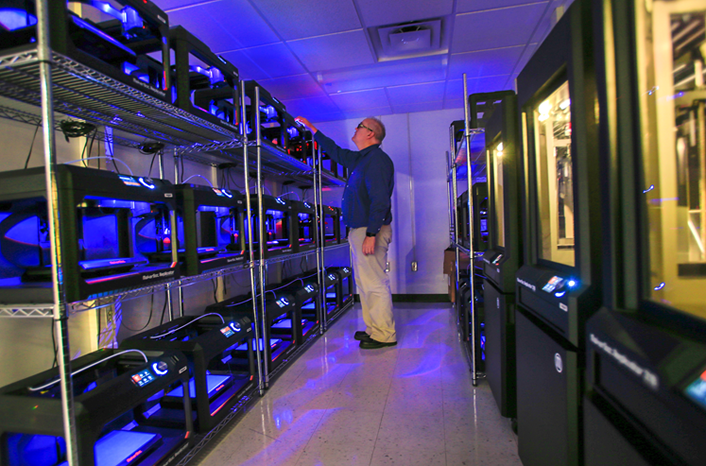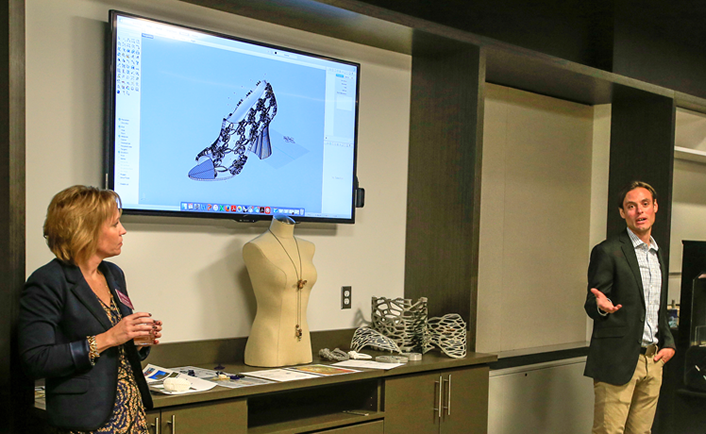Key Takeaways
- Central Michigan University opened the MakerBot 3D Printing Innovation Center in fall 2015 to foster technological innovation and entrepreneurship among faculty and students.
- While the center is intended to inspire creativity and entrepreneurship for students and faculty, students also have opportunities to take structured courses related to 3D modeling and printing.
- Students and faculty reacted positively to the first classes offered in the MakerBot Innovation Center, with further classes likely this year as faculty gain more experience with 3D printing and design.
In the fall of 2015 Central Michigan University opened the MakerBot 3D Printing Innovation Center, available to the entire campus community. The center makes CMU one of six higher education institutions nationwide to have a full MakerBot Innovation Center.
The lab houses 30 3D printers (a combination of 5th-generation and Z18 MakerBot printers) and several desktop scanners. The hardware and software innovation package cost approximately $357,000, and the room to house the new lab had to be remodeled and wired to support the new equipment. Construction on the space was completed during summer 2015, and the lab was installed in the fall. The lab received joint funding support from the CMU College of Education and Human Services, the CMU College of Communication and Fine Arts, and the Provost's Office.
Training and Support
The CMU College of Education and Human Services consistently awards funds to faculty to support technological advancement in the classroom. In 2014, my colleague Susanne Wroblewski and I applied for and received funds via this program to purchase a MakerBot Z18 3D printer. The acquisition of this equipment started us on a path that culminated in the opening of a full-service MakerBot Innovation Center at CMU in 2015.1
The grant also provided funds for on-campus training. To maximize learning opportunities, we invited colleagues from across campus to an intensive four-day workshop hosted by a MakerBot trainer. The workshop introduced participants from CMU's Fashion Merchandising and Design program to potential collaborators in the School of Engineering and Technology and the Department of Art and Design.
This initial training introduced us to basic printer functionality as well as techniques for 3D modeling using Tinkercad and 123D Design. We also learned of MakerBot's desire to establish 3D printing innovation centers at institutions of higher learning. We were immediately interested. My colleague Larry Burditt, from the art and design department, and I quickly shared the opportunity with our respective deans. From there, interest spread quickly, and cross-college collaboration resulted in the development of a proposal submitted to the provost.

Larry Burditt in the MakerBot lab
In the Classroom
After completing the initial MakerBot training in January 2015, I received additional support from a pedagogy grant offered through the CMU College of Education and Human Services to attend a fashion and 3D printing workshop in Brooklyn, New York, hosted by 3D printer and fashion designer Francis Bitonti. This two-week experience introduced me to 3D modeling using Rhino, with a specific focus on footwear. Students from around the world worked together to learn Rhino functions, with each student ultimately designing a footwear prototype that was then printed on a MakerBot 3D printer.
These combined training experiences and further personal experimentation led to the development of a new course at CMU, 3D Printing and Fashion. The course was offered for the first time in fall 2015 to a combination of upper-level undergraduate and graduate students. Students completed three projects in the course: jewelry design, footwear design, and a final body adornment piece. The semester culminated in an exhibition of student work to which the public was invited.

Nel Boose and Michael Pritchard, MakerBot sales representative, at the MakerBot reception
Student feedback from the course was very positive. As senior Alexis Quinney explained,
"Taking the 3D Printing and Fashion course as a merchandising student ignited an interest I never knew I had. The process of 3D modeling and how it can be applied to fashion design, product development, and merchandising is something I plan to study further."
Susanne Wroblewski, a graduate student and fashion merchandising and design department support staff member, looks at design from a functional perspective:
"My focus is transitioning to include a greater emphasis on the aesthetics of design. Three-dimensional printing provides a medium with fewer limitations on what is possible. The fused deposition modeling process allows you to create interlocking pieces, sharp edges, bulbous shapes, and tight corners that are not possible or practical with traditional manufacturing processes. It stretches you to see design differently."
Fashion merchandising and design faculty are looking at opportunities to integrate 3D modeling/printing as a design tool in various courses. In the Interior Design department, Julie Zou uses the MakerBot center to introduce her students to 3D printing and possible interior designs. In spring 2016, Greg Stahly, a ceramicist in the Department of Art and Design, offered the course Creation in 3D. Students in the course work primarily with 123D Design to create a variety of artistic and functional objects.
Ultimately, faculty and administrators across campus anticipate the generation of new ideas and partnerships through the addition of this 3D printing resource. With a productive new set of equipment and software already teaching students new skills in fashion and art design, I expect to see more classes offered soon taking advantage of the 3D printing opportunities in the MakerBot center.
Note
- "Building Creativity and Collaboration: CMU Opens MakerBot Innovation Center with 3D Printers," [https://www.cmich.edu/news/article/Pages/Building-creativity-and-collaboration-CMU-opens-Makerbot-Innovation-Center-with-3D-printers-.aspx] CMU News, October 15, 2015.
Michael Mamp is an assistant professor in Fashion Merchandising & Design at Central Michigan University where he teaches courses in 3D Printing, Visual Merchandising, and the History of Western Dress. Mamp has won a number of honors and awards, including a Teaching Excellence Award at Iowa State University. He graduated from Central Michigan University with a bachelor's in Apparel Merchandising and Design; earned a master's in Textile and Apparel Design from the University of Nebraska–Lincoln; and was awarded a PhD in History of Dress and Textile Design from Iowa State University. He has exhibited his creative work via national and international venues.
© 2016 Michael Mamp. The text of this EDUCAUSE Review article is licensed under the Creative Commons BY-NC-ND 4.0 license.
